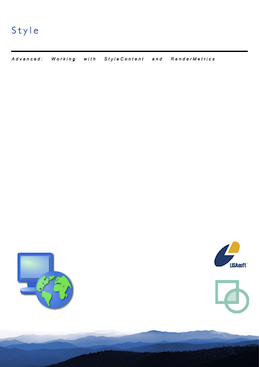Style Tutorial¶
Control the rendering process by adding a custom style for the style blackboard.

This workbook is part of our commercial training materials.
- See the main uDig website for details on training and support
- Commercial Training materials are available to Academic students on request
Source code:
- Available in your uDig SDK (import the source code from the plugins view)
- plugin: net.refractions.udig.tutorials.style.color (github)
Introduction¶
In this workbook we are going to create our own style content; and use it to control the CSVRenderer created earlier.
We will be covering the following ideas:
- styleContent - used to host a value on the style blackboard
- stylePage - contributed to the style editor allowing the user to change values on the style blackboard
- IMemento - eclipse interface used to advertise persistent storage
We will also revisit the RenderingMetrics contract covered in the last tutorial.
What to Do Next¶
For better understanding of these facilities please try the following:
Switch¶
Can you arrange to switch between the ColorCSVRenderer and the CSVRenderer? What code do you need to add to make this happen?
Hint: Consider what is going on with the style blackboard
User supplied Default Color¶
Can you modify the code to read in a default color stored in a CSV file comment?
# ff00cc
SLD¶
Advanced: The net.refractions.udig.style.sld plug-in holds a GeoTools FeatureTypeStyle object on the blackboard using the key SLDStyle.ID.
Adjust your ColorCSVRenderer to recognize SLDStyle.ID as well.
Hint: Use the SLD utility class to obtain a color from the first PointSymbolizer.
Hint: You should be able to drag and drop an sld file onto the layer to have it stored on the blackboard. If you do not have an sld - open up a point layer and visit the advanced page of the style editor. You can export this xml as an “sld” document.
Tips, Tricks and Suggestions¶
The following tips have been provided by the udig-dev list; please stop by and introduce yourself.
Commercial Training Materials¶
Please contact any of the organisations listed on the main uDig support page for details on uDig training.
The workbooks and slides for the training course are available here:
This is a private svn repository that is open to those who have taken the training course.
Academic Access¶
The course materials can be made available to those working at academic institutions - we ask for an email from your Professor.
Please ask your professor to email admin@refractions.net with the request.